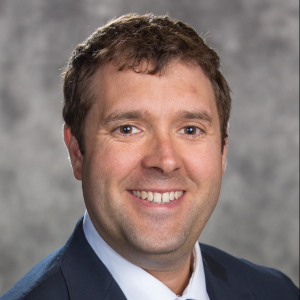
Nick Wattie, PhD
Associate Professor
Associate Dean, Research and Graduate Studies
Faculty of Health Sciences
Associate Dean, Research and Graduate Studies
Faculty of Health Sciences
Nick Wattie's research focuses on breaking down psychosocial and environmental barriers to athlete development and high-performance sport
Full biography
The making of a high-performance athlete stems from more than merely genetics or solely practice. Nick Wattie, Ph.D., Assistant Professor in the Faculty of Health Sciences, studies the psychosocial and environmental constraints on sport participation and sports expertise, as key determinants in moulding an elite athlete. He examines biases that influence athlete development such as socioeconomic status; and further explores the theory that community population and available sports facilities are contributing factors. Understanding the types of environments that are more conducive to positive athlete development can have policy implications in neighbourhood design and resource allocation. Focused on talent identification and sports development, Dr. Wattie’s research also investigates the impact of the relative age phenomenon in sport and education. His research aims to understand how the social policy that results in age differences within a cohort creates different developmental experiences for children. Notably, Dr. Wattie aims to determine the biases and constraints that influence parasport athletes in Canada. In collaboration with key stakeholders including the Canadian Sport Institute Ontario, Own the Podium, and Wheelchair Basketball Canada’s national development teams, he is assessing how these athletes develop, and identifying unique characteristics of their experiences and trajectories compared to able-bodied athletes. The goal is to better understand skill acquisition among high-performance parasport athletes. Beyond elite athletes, Dr. Wattie’s research also looks at the psychosocial and physical health outcomes associated with sport participation in youth and older adults. He joined in July 2014, following a three-year post-doctoral research fellowship in the School of Kinesiology and Health Science at York University. He is co-editor of the upcoming Routledge Handbook of Talent Identification and Development in Sport. Avid sport participation during his youth naturally funnelled Dr. Wattie into the field of kinesiology. In 2005, he earned his Bachelor of Life Sciences and his Bachelor of Physical & Health Education, both at Queen’s University in Kingston. In 2007, he received his Master of Arts in Kinesiology from York University’s School of Kinesiology and Health Science in Toronto; and in 2011, he received his Doctorate from the Carnegie Faculty of Sport and Education at Leeds Metropolitan University in West Yorkshire, England. Ontario Tech University
Areas of expertise
Athlete developmentEpidemiologyPositive youth developmentSkill acquisition and motor developmentSports psychologyConstraints on sport expertisePsychosocial and physical health outcomes associated with sport participationPsychosocial and environmental constraints on sport participation and sport expertise
Speaking Engagements
- Montréal, Québec December 31, 1969Exploring Intercity Variability in the Development of National Hockey League players from Ontario and QuébecThe North American Society for the Psychology of Sport and Physical Activity (NASPSPA) 2016 Conference
- Montréal, Québec December 31, 1969A Systematic Review of 25 Years of Research in Talent Selection: Preliminary ResultsNASPSPA 2016 Conference
- Montréal, Québec December 31, 1969The Interaction of Between Year- and Within Year-Effects in Youth SoccerNASPSPA 2016 Conference
- McMaster University, Hamilton, Ontario November 3, 2016Ultimate Costs of Expertise: A Review of Mortality in Elite AthletesEastern Canada Sport & Exercise Psychology Symposium
- McMaster University, Hamilton, Ontario November 3, 2016Development in Para-athletes; What do we Know?Eastern Canada Sport & Exercise Psychology Symposium
- Edmonton, Alberta December 31, 1969Understanding the Origins of Canadian Olympic Performance: Geographic Constraints on the Acquisition of Sport ExpertiseUnderstanding the Acquisition and Maintenance of Sporting Expertise: Current Perspectives Symposium at the Canadian Society for Psychomotor Learning and Sport Psychology (SCAPPS) Annual Conference
- Edmonton, Alberta December 31, 1969Development of Expertise in Canadian Wheelchair Basketball PlayersUnderstanding the Acquisition and Maintenance of Sporting Expertise: Current Perspectives Symposium at the SCAPPS Annual Conference
- Bern, Switzerland December 31, 1969A Between-Province Investigation of the Birthplace Effect Among Elite Canadian Ice Hockey Players, Symposium14th European Congress of Sport Psychology
- Bern, Switzerland December 31, 1969Relative Age Effects in Elite German Youth Basketball, Symposium14th European Congress of Sport Psychology
- Bern, Switzerland December 31, 1969Transferability Between Virtual and Real Darts: A Training Study on Throwing Performance and Quiet-Eye Behaviour with Novices, Poster Presentation14th European Congress of Sport Psychology
- Toronto, Ontario December 31, 1969Searching for Common Ground in an Uneven Playing Field: Exploring Participation Biases in High Performance SportPan American Sport and Exercise Research Summit
Affiliations
- Socièté Canadienne D’Apprentissage Psychomotor et de Psychologie du Sport / Canadian Society for Psychomotor Learning and Sport Psychology
- North American Society for the Psychology of Physical Sport and Activity


